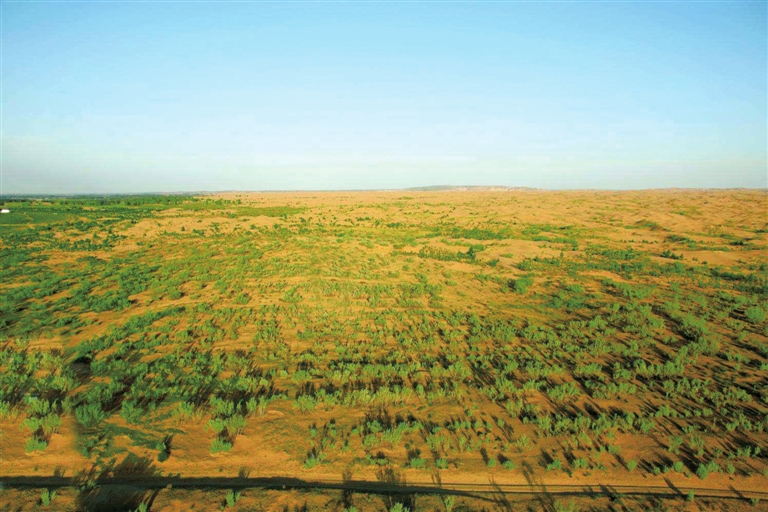GONG WEI and ZHANG QI: Concept of ‘ecological progress’ drives Paris Agreement forward

After decades of efforts to prevent and control desertification, the ecological condition of the hilly area and sandy desert of Ordos, southwest of Inner Mongolia Autonomous Region, has been greatly improved.
The landmark Paris Agreement has put the world on track in its collective response to climate change. But only half a year after the accord entered into force, the United States announced it would withdraw, posing the greatest challenge the accord has faced since it was negotiated at the 2015 UN Climate Change Conference. In light of this, China continues to enhance the agreement by adhering to the concept of ecological progress and remains committed to its obligations under the agreement.
Ecological progress is a governance concept stressed at the 18th National Congress of the Communist Party of China to address the environmental costs of the country’s rapid economic development, including pollution, ecosystem degradation and resource constraints. Characterized by a new outlook on development, new guidelines for administrative performance, and new ways of production and living, the concept replaces the nation’s former norms and mode of development. Since it was put forward, green, circular and low-carbon development has made great strides in China, earning praise from the international community. The international influence of the concept is growing because China’s strategy of ecological progress offers a viable way to achieve sustainable global development.
China has played an active role in the negotiation and implementation of the Paris Agreement, which advances not only the national interest but also the common interest of all humanity. In promoting the fulfillment, adjustment and perfection of the agreement to foster international cooperation on climate change, we see the practical application of ecological progress from the following perspectives.
The community of common destiny, a foreign policy vision that was proposed by China, is an important foundation of international cooperation on ecological progress. Ecosystems are integrated and not confined by artificial borders. In an attempt to view the international community from a new perspective, China proposed the concept of the community of common destiny, which takes the interdependency and interconnectedness between human beings as a starting point. Therefore, the vision is applicable not only in the international political, economic and cultural cooperation, but also in the ecological sphere, including climate change.
In the spirit of a community of common destiny, China has shouldered its share of the burden in the Paris negotiations, and is fulfilling its obligation to reduce greenhouse gas emissions, which, for the first time, renders the agreement to enlarge its binding force of this obligation into all nations including developing countries.
Moreover, the concept of ecological progress is also closely intertwined with the values of friendship, justice and shared interests that China cherishes. The rapid economic development of China also means a surge in energy consumption and greater challenges for environmental protection. For China, the values of justice and benefit imply that the pursuit of people’s interests and ecological protection should come together.
The values are also advisable for the international community. However, in performing its historic obligation and the common but differentiated responsibility to offer developing countries climate change funding and technology, developed countries have not taken effective measures to fulfill their promises.
China pledged to greatly lower its carbon dioxide emissions per unit of GDP and invest in renewable energy. It is also vigorously advocating afforestation. In addition, it announced it would set up a 20-billion-yuan South-South Climate Cooperation Fund.
It is noteworthy that China’s engagement in the international cooperation on climate change not only refers to Chinese promises, obligations or deeds but also Chinese experience and ideas. Having positively impacted and enlightened other countries and regions, China’s concept of ecological progress has in some sense helped to realize the Paris Agreement. Therefore, this concept should continue to be insisted so that its influence grows and it can benefit all of humanity.
Gong Wei is a professor from the School of Law at Guizhou University; Zhang Qi is a post-doctoral student of environmental law at Chongqing University.
